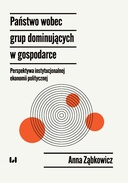Explore

Państwo wobec grup dominujących w gospodarce – perspektywa instytucjonalnej ekonomii politycznej
Anna Maria Ząbkowicz
2023
0 Ungluers have
Faved this Work
Login to Fave
The book dwells on views and cognitive apparatus worked out in this strand of social thought where collective action and particular groups interests carry weight. It claims that such theorizing leads to the substance of economic activities in our surroundings more certainly than methodological individualism does. In most compact way, the contents of this book can be characterized by referring to a couple of research perspectives, and the scope of its theoretical background can be marked by several great researchers‘ names. Firstly, deeper understanding of economic performance, as Douglas C. North and his followers argue, requires consideration of economic activities as well as polity, where property rights and incentives structure are determined. Secondly, public and economic policies can not be regarded to be exclusively government’s domain, being to some extent the outcome of activities of organized interests and group interest representations. As Wolfgang Streeck put it, “capitalism is under renegotiation”. The contemporary democratic polity sees representations of labour interests, non-governmental organizations, etc. However, as John K. Galbraith points out in some of his works, the axis of renegotiation in capitalism has been constituted by relations between contemporary state and organized groups of mighty enterprises, “corporations”. These business groups (“business” in broad sense), apart of winning profits, can influence economic outcomes. The latter means economic power. Profit-oriented groupings or “corporations”, according to Susan Strange, exert impact simply because of weight and position they have in economic structure either intentionally, via their organizations and lobbyists in the polity. That’s why they penetrate society as a whole, not economic economic activities alone. In result, contract relations and respect for financial surplus overcome social relations. Argumentation thus oriented is backed by description of real processes. The corresponding parts of the book contain short studies on financialization, narrow interest representations and contemporary transformation of democratic welfare state which is a debt state in fact. Old theories inspire understanding of new configurations.
This book is included in DOAB.
Why read this book? Have your say.
You must be logged in to comment.
Rights Information
Are you the author or publisher of this work? If so, you can claim it as yours by registering as an Unglue.it rights holder.Downloads
This work has been downloaded 37 times via unglue.it ebook links.
- 37 - pdf (CC BY-NC-ND) at Unglue.it.
Keywords
- Capitalism
- Corporations
- democratic welfare state
- economic theories
- financialization
- polity
Links
DOI: 10.18778/8331-059-6Editions

